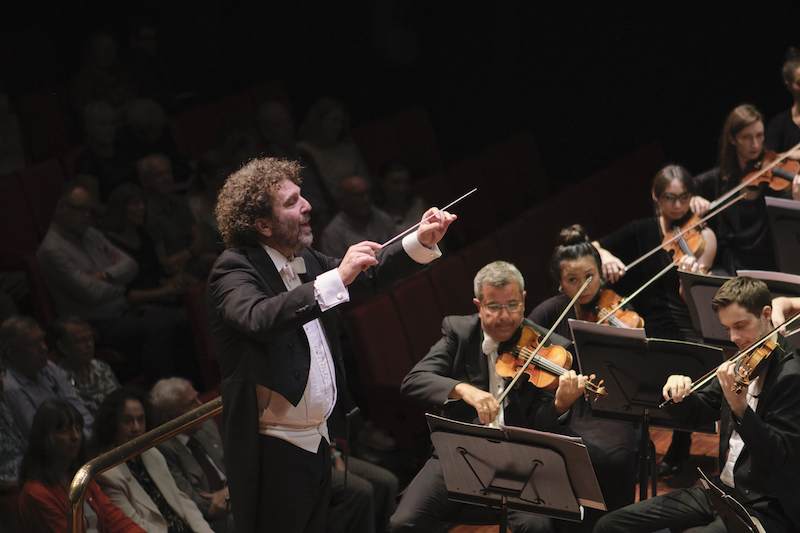The West Australian Symphony Orchestra was reunited with principal conductor Asher Fisch for their 2021 season opener, and Rosalind Appleby says it was a performance that spoke of hope.
A concert for these times
7 March 2021
- Reading time • 6 minutesMusic
More like this
- Rewriting tradition with skill and charm
- Close encounter stirs the soul
- The great unknown
‘Romance and Mystery’, West Australian Symphony Orchestra ·
Perth Concert Hall, 5 March, 2021 ·
What music do you listen to when you need hope? Composers in Western music’s Romantic era (roughly 1800-1920) knew how to depict emotional complexities – the struggles and the triumphs of life. We heard both on Friday night at the launch of the West Australian Symphony Orchestra’s (WASO) 2021 season, and it was the light that prevailed.
Perhaps that was because we were looking for hope after a year that has already been upturned by catastrophic bushfires and a COVID lockdown. Or perhaps it was because of the unquenchable joy radiating from principal conductor Asher Fisch, who is based in Germany, as he emerged from quarantine to lead his orchestra for the first time in 12 months. The roar of applause from the audience to greet him lasted several minutes.
Fisch and WASO were joined by Adelaide-based pianist Konstantin Shamray for Rachmaninov’s Second Piano Concerto (1901), a quintessentially human outpouring of emotional extremes. It was the first work Rachmaninov wrote after the disastrous premiere of his First Symphony (1897), which led to a hiatus in composing of several years.
The concerto’s explosiveness is balanced by some of the most serene music in the canon, and Shamray indicated in the opening chords that he could segue seamlessly between Rachmaninov’s silken delicacy and bold aggression. His immaculate technique made light work of the ferociously difficult piano writing, but it was the tenderness of his softer phrases, the caressing way he drew out the last note of each phrase, that really spoke to me.
In the second movement, Rachmaninov breathes hope and peace to soothe the tensest shoulders and smooth the most wrinkled brow. The questioning melody was stretched gently between instruments, shaped with heart-aching beauty and resolved like a communal exhale. And then, emerging from the wrestling fugue of the final movement came a confident theme – clean, urgent and triumphant – that seemed to dance from Shamray’s hands. Throughout, the orchestra accompanied with urgency and passion, as though Fisch, like Rachmaninov, had an accumulation of ideas and emotions that needed to be expressed.

Before this cathartic performance we were treated to the world premiere of a work by West Australian composer Olivia Davies. Still in her 30s, she has established a unique voice characterised by music that eschews melody in favour of floating hazes of sound that evoke space and movement within stasis. Davies has worked with small-to-medium sized ensembles such as Decibel, Ensemble Offspring, and the Australian Chamber Orchestra Collective. This composition for WASO, commissioned by Prue Ashurst, provided the opportunity to explore these ideas on a larger scale.
Stratus opens with white noise from the strings playing with extreme sul ponticello, bowing softly, half on strings and half on the bridge supporting them. The rasp of a bow on a cymbal adds an eeriness to these long lines of icy sound. As the title suggests, Stratus is inspired by low cloud layers and Davies cleverly uses a variety of creative compositional techniques to evoke a grey horizon of sound. A rhythmic pulse forms and the sound deepens with the addition of tuba and low strings. Swirls of micro-sounds erupt – a flock of birds or a swarm of insects? – and the work builds to a quite sudden and glacial climax. Mournful brass notes fall like drops of water as the work winds down (it feels too soon) to an ending as wispy as the opening. Stratus is an exploration of orchestral texture that holds together with satisfying coherence and is compelling in its freshness.
Like Rachmaninov, Elgar was struggling in a slump of self-doubt when he wrote his ‘Variations on an Original Theme’ (Enigma), the final work on WASO’s program. He had been considering giving up music when his publisher took him on a long walk and talked to him about how Beethoven channelled his troubles into music. The result is the sublime Ninth Variation, called Nimrod, and inspired by the memory of that hope-filled conversation. The movement is one of 14 variations built around a haunting melody, each rich with melodic ideas and musical caricatures.
Fisch and orchestra traversed the contours of each variation, picking out the humour, the pastoral serenity, the romance, the weighty Germanic density, but always within a restrained English nobility. I marvelled again at Fisch’s ability to define musical ideas, drawing great clarity and devotion from his musicians. The emotional epicentre was the Nimrod variation, its string chorale played with extreme softness and then enlarged by the brass into Elgar’s magnificent musical statement of hope, bathing all of us in the auditorium like a glorious sunrise.
Fisch mentioned from the podium that he was grateful to the McGowan government for allowing him back into Western Australia, saying: “Even though I am not a mining engineer, the government considered that I was an essential worker.”
His performance with WASO confirmed that the life-giving force of music is indeed an essential part of human existence.
Click here to see WASO’s 2021 season program.
Pictured top: The West Australian Symphony Orchestra conducted by Asher Fisch with Adelaide-based pianist Konstantin Shamray. Photo Rebecca Mansell
Like what you're reading? Support Seesaw.






